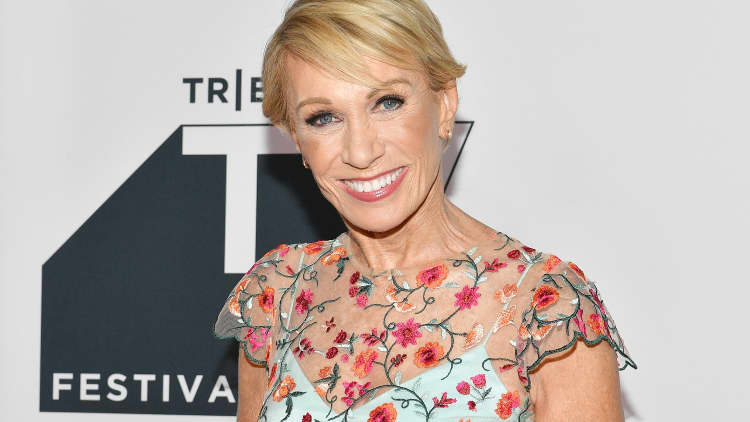This story is part of CNBC Make It's new millennial home-buying series. If you're interested in being featured, email reporter Alicia Adamczyk at alicia.adamczyk@nbcuni.com.
A few years after starting her career in medical sales in Atlanta, Kelcie Evans knew she wanted to put down roots. The New Jersey-native had lived in the city since she moved south for college and loved everything the area has to offer.
"The city has a really strong culture," Evans tells CNBC Make It. "Atlanta is super diverse, and the cost of living is fairly low. There's a lot of people my age; it's a fun place to live."
As she watched Atlanta's real estate market heat up, she knew she wanted to make an investment so she could build equity rather than throw money away on a rental every month.
But it wasn't until the 25-year-old learned about Invest Atlanta, the city's economic development agency, that she realized just how feasible buying really was. Invest Atlanta offers a home-buying assistance program to households under a certain income threshold, and Evans qualified. Her mortgage broker was able to bundle together $20,000 from Invest Atlanta and $20,000 from the Atlanta Housing Authority, for a total of $40,000 in down-payment assistance.
Atlanta has been through a lot of gentrification, but the prices are low compared to where I grew up in New Jersey. I thought it was really affordable.Kelcie EvansHomeowner
Each year Evans owns the house, a portion of the $40,000 is forgiven. If she sells the house before the grant is forgiven, she has to repay the balance, and Invest Atlanta and the Atlanta Housing Authority receive a percentage of her sale.
But Evans thinks she'll be sticking around for a while. She's looking into graduate school in the city and has no plans to leave in the next few years.
"Atlanta has been through a lot of gentrification, but the prices are low compared to where I grew up in New Jersey," she says. "I thought it was really affordable."
In fact, Evans' housing costs, including her mortgage and Home Owners Association fees, total $1,100 per month, $350 less than the $1,450 she was paying to rent a studio apartment.
"Of course there are extra bills," she says. But she feels a peace of mind knowing that her monthly payments won't increase the way they might have if she was still renting.
Here's what Evans learned throughout her home-buying process.
It might take a while
Especially in a hot market like Atlanta, it can take longer than you might expect to find the perfect home. Evans' search began in May 2018, and she didn't closed until February 2019.
"My lease was up in August 2018, so I started looking in May. I thought I could find something by then," she says. "But the market is really hot in the spring and summer, so the prices were sky high. I was competing against people with double my income, [offering] all cash. I kept getting beat out."

Skylar Olsen, Zillow's director of economic research, tells CNBC Make It that timing is one of the trickiest aspects of buying a house, especially now with affordable housing inventory low across the country. If you start the process while renting and haven't closed by the time your lease is running out, she suggests explaining your situation to your landlord and asking for a month-to-month lease.
Get ready to compromise
Two properties fell through early in Evans' search, including one that was $230,000, right in her original budget. Eventually she closed for $190,000, and she's grateful she ended up buying a less expensive house.
"Once you take everything into account — the private mortgage insurance, the HOA fees — it's a lot higher than you thought it would be," she says. "The houses priced at $230,000 have everything I want, but it wasn't until I was trying to close the deal on my first place, and the mortgage broker was showing me the math that I was like, Okay, wow."
Evans says it's important to make compromises. Her neighborhood isn't as walkable as she would like, but she says that will come with time. She lives on the BeltLine, which is a sustainable redevelopment project that is "transforming the city." As her neighborhood becomes more developed, she expects her property value to rise.
When you're decided what your deal-breakers are, Zillow's Olsen adds that it's especially important to remember that you're looking not just for your immediate needs, like a short commute, but your long-term needs, like good schools. "Think of your needs in three, five or six years," she advises.
Pick the right agent
When Evans first began the process of looking for a house in May 2018, she used a realtor recommended by her father, who lives in New Jersey. But eventually, her mortgage broker, Russell Elam of Castle & Cooke Mortgage, recommended Derrick Duckworth, owner of The Beltline Team realty.
Evans says working with Duckworth made all the difference in her search: He found listings in her preferred neighborhood that weren't on her radar, and, more importantly, he was familiar with how the Invest Atlanta down-payment assistance program worked. When it came time to make an offer and settle all the paperwork, she says, Duckworth's know-how made the process near seamless.
Zillow's Olsen says that finding the right agent is one of the most important steps in the process. You want someone experienced in your particular area, and you often don't want to go with the first person you meet, she says. She recommends reading reviews online.
"We don't buy homes often enough to be good at it," she says. "That's the real value proposition of agents. Your agent is your liaison to the seller and the seller's agent. If you have a down-payment assistance program, and you have an agent who's well versed in it, you're [more attractive] to the seller."
Come prepared
As she was just starting her career and wanted to buy in a hot market, Evans knew she had to do her homework before she began looking so she wouldn't miss out on her dream home. That included a meeting with the Invest Atlanta program to make sure she understood all of the details, as well as preparing all of her paperwork.
"When it was time to start the process, I had all the information I needed," she says. "There's a lot of competition —especially when you're young, there's always going to be people with a lot more money than you."
That also meant having savings ready to go to cover all of the extra expenses that crop up throughout the process. Though Evans' down payment was covered by Invest Atlanta, she still needed cash to cover escrow expenses, the inspection and appraisal, and she opted to give the home a fresh coat of paint before move-in. That all added up to around $7,000, she says, not counting moving costs and furnishings for her new place. You can also expect recurring costs like property taxes, homeowners insurance and title insurance.
How to find a first-time homebuyer grant
Buying a home can seem out of reach for young people and those without six-figure incomes — in fact, more than two-thirds of renters say that saving for a down payment is a major barrier to home ownership, according to the Urban Institute's Housing Finance Policy Center. Zillow found that all things being equal, it takes a year and a half longer, on average, for a millennial to save up for a 20% down payment than it did for Baby Boomers in the '80s, thanks to stagnant wages and soaring housing costs.
But down-payment assistance programs — used by just over 10% of home buyers in 2018, according to CNBC — offer a way to build up the standard 20% down payment. You can look for individual grants in your city or community, or combine multiple grants, as Evans did.
A real estate agent well-versed with the programs is crucial, as Duckworth was during Evans' search. Many programs are capped by income, but the thresholds vary greatly by state, county and even city. Per the Urban Institute, there are thousands of active programs across the country, which you can explore using this interactive map, and find detailed in this report. This list breaks down programs by state, and you can also search "[your state] + down-payment assistance programs" to find more in your area.
It is also possible to put far less than 20% down, assuming you have a good income and credit score.
Many of Evans' friends are interested, she says, when they come over and see her place. She's become an advocate for the Invest Atlanta program.
"I definitely urge people graduating, people in grad school, to do it," she says. "The money is out there, but who knows how long it will be."
Don't miss: How a 25-year-old making $70,000 in New York City spends her money
Like this story? Subscribe to CNBC Make It on YouTube!



